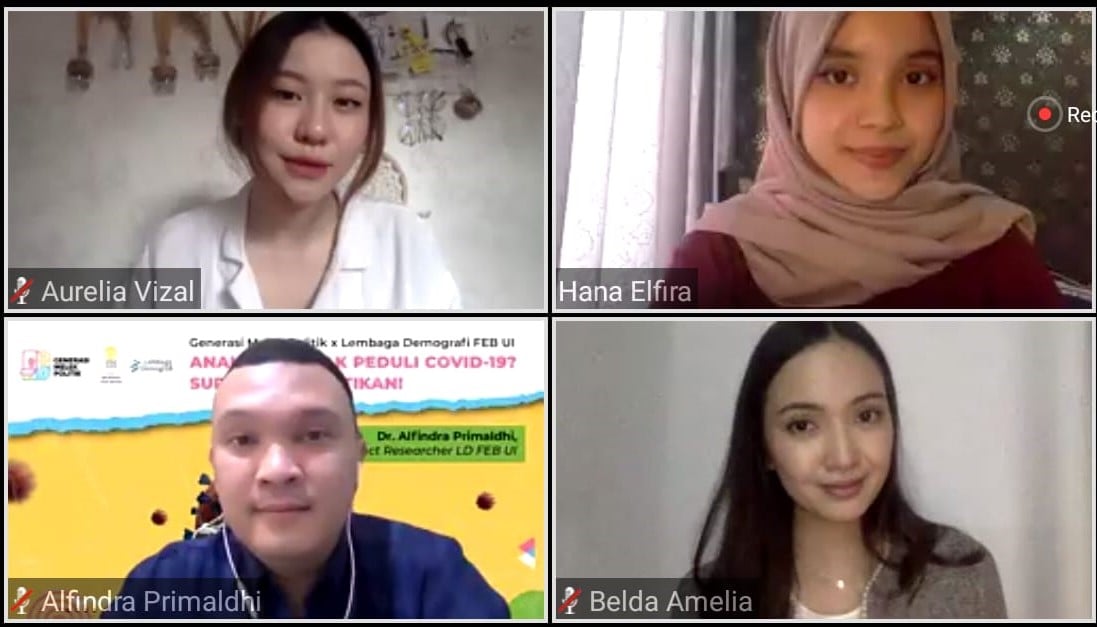Indonesian Youth Don’t Care About COVID-19?
Research Explains Why
DEPOK – (30/8/2020) Generasi Melek Politik (GMP) – literally meaning the Politically Aware Generation – and the Demography Institute, Faculty of Economics and Business, Universitas Indonesia (LD FEB UI), held a webinar to discuss the results of research entitled “COVID-19 Risk Perceptions among Members of Generation Z during Adaptation to New Habits” on Sunday, 30 August 2020, 13.00 West Indonesia Time.
The quantitative research was conducted to obtain a picture of the behavior and risk perceptions among members of Generation Z (12-25 years old) in Indonesia during adaptation to the new normal. As many as 875 respondents from 33 provinces and more than 250 regencies/cities in Indonesia participated in the online survey conducted via the @geenrasimelekpolitik’s Instagram account.
Dr. Alfindra Primaldhi, adjunct researcher at LD FEB UI, explained that 88% of Gen Z respondents understand that the Corona virus that causes the lethal COVID-19. Gen Zers in Indonesia are also aware of the benefits of following health guidelines, especially the 3M protocol (wearing a mask, keeping a safe distance of 1-2 meters, and washing young hands as often as possible), to lower the risk of COVID-19 infection.
In this period of new normal, many people want to resume activities, including recreational activity, after months of staying at home. So, what is Gen Z’s perception of the new normal?
“We see that lately, cycling has become a trend. This is a good thing to maintain physical and mental health. Our study showed that cycling is considered low risk, with only 37% of respondents consider cycling without following health and safety guidelines is high risk. In reality, there is still a risk of being exposed to viruses when cycling. Therefore, the health protocols should be followed to stay safe while cycling,” said Dr. Alfindra Primaldhi.
Recently, the government announced the plan to reopen cinemas. In the research, the majority of Gen Z respondents consider watching movies in cinemas without the proper health guidelines as high risk. Even with health protocols in place, 18% of respondents consider watching movies in cinemas still poses a high risk. Therefore, there should be a clear health protocol for cinemas. Supervision is also crucial to ensure that the health protocol is strictly followed so that young people will not hesitate to go to the cinema.
Aurelia Vizal, the Generasi Melek Politik Ambassador, explained that Indonesian youth are very aware of the COVID-19 health risks. However, there is a trust issue with the government. Many young people are skeptical about the government’s ability to deal with the pandemic.
“Every generation has their own defining moments, and for Gen Z, it’s COVID-19. Terrorist attacks were the defining events for millennials; the assassination of John F. Kennedy for Baby Boombers, and recession for Gen X. These defining moments will have an effect on the viewpoint and how Gen Z perceives things in the future. Therefore, the government should be open about the development of the pandemic. This does not mean that we think the government is failing. Information openness will resolve our trust issue with the government. This will encourage more young people to follow government instructions such as to wear masks every time we go out.”
Another panelist, dr. Belda Amelia, currently an intern at a COVID-19 referral hospital in Jakarta, explained that the COVID-19 vaccine is urgently needed. However, lengthy clinical trials should be conducted before a vaccine is produced. “Not only the COVID-19 vaccine, vaccines for other diseases also take a long time, can be more than 10 years, starting with planning, followed by repeated testing and finally the distribution to effectively function in the human body. Currently, the COVID-19 vaccine is still in the making and being tested and cannot be expected to be ready in less than one year.”
The webinar also urged Generation Z to become an agent of change to encourage adherence to health guidelines, especially among peer groups. In the new normal condition, many people have resumed activities outside the home for recreational purposes. However, it is important for young people to engage in low-risk recreational activities, such as outdoor activities or activities in open spaces. Moreover, young people still have strong immunity system but are prone to become carriers to their immediate circle such as family members. Therefore, young people still need to follow the 3M protocol of wearing a mask, washing their hands, maintaining social distance, and avoiding crowds.
The survey results can be downloaded at http://bit.ly/GenZnCovid
(lem)

